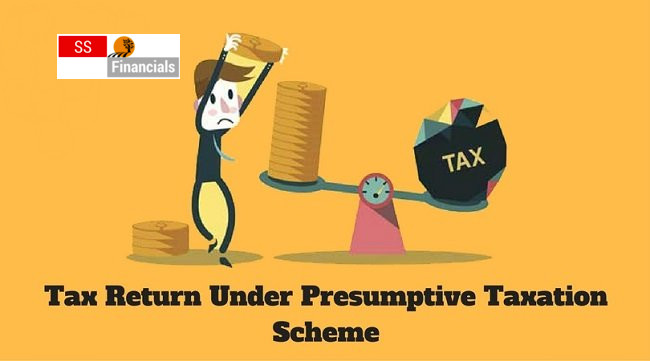What is Presumptive Tax Scheme?
- Posted by SSdigitalBE
- On October 28, 2019
- 0 Comments
The presumptive tax scheme is meant for small business owners and people having professional income as keeping a record of all their business expenses to file the Income Tax Returns (ITR) is difficult. So individuals eligible forq this method are not required to maintain the accounting book.
Eligibility for the Presumptive Taxation Scheme
This facility can be availed by those taxpayers who comply with section 44AD, 44AE, and 44ADA criteria of the I-T Act. An individual can file ITR under presumptive tax if, as per section 44AD, he/she runs a business other than leasing of goods carriages, plying, agency business, brokerage, etc. He/She can be a resident, including individuals, Hindu Undivided Family, or a partnership firm. However, taxpayers whose turnover during the relevant financial year is over Rs. 2 crores are not eligible to file the presumptive tax under section 44AD. The income of the taxpayer under this section is computed as 6% or 8% of the gross business turnover during the relevant financial year. Taxpayers can voluntarily calculate income at more than 8%.
Similarly, section 44ADA allows eligible professionals to file the ITR under the presumptive taxation method. Eligible professionals include accountants, doctors, and architects, among others. However, if the gross receipt during the relevant financial year exceeds Rs 50 lakh, the taxpayer is not allowed to avail the presumptive scheme.
Section 44 AE, on the other hand, allows the filing of returns under the presumptive method to people in the business of plying, goods carriages, etc.
Eligible professionals
Also, Section 44 AE allows the filing of returns under the presumptive method to people in the business of plying, goods carriages, etc.
While opting for
Filing tax returns under section 44AD
As mentioned above, the presumptive taxation method under section 44AD applies to taxpayers who are engaged in the occupation of business. Under this section, the income of the taxpayer is calculated as 6% or 8% of the gross business receipt (turnover) during the relevant financial year. So, the taxpayer doesn’t need to deduct the expenses from the gross receipt to calculate their income. The taxpayer can voluntarily calculate income at more than 8%
Filing tax under section 44ADA
A taxpayer who earns professional income can file the presumptive tax under section 44ADA. Under this scheme, the income is calculated as 50% of the gross receipt from the profession. The taxpayer is allowed to claim an income of more than 50%. That being said, under this presumptive scheme, the taxpayer is not allowed to claim additional expenses for deduction after computing a 50% profit from the gross income.

So, why you should opt for presumptive taxation?
The most important reason to adopt the presumptive taxation method for filing ITR is that you don’t need to maintain books of account under section 44AA. If your business/professional expenses are less than the threshold under the presumptive scheme, you can simply make the applicable deduction to compute the income without the need of maintaining the books of account. However, if your expenses exceed the limit, i.e., your profits are less than 50% or 8% from a profession or business income respectively, you will have to maintain the books of account and also get them audited under section 44AB of the I-T Act.
So, if you are not expecting to cross the gross receipt limit as per the presumptive scheme during the relevant financial year, the presumptive taxation method can save you from lots of paperwork and significantly reduce your accounting expenses.
On the other hand, if you are a professional who also owns a business, you too can avail the facility of presumptive taxation, provided you can distinguish both the occupation and



0 Comments